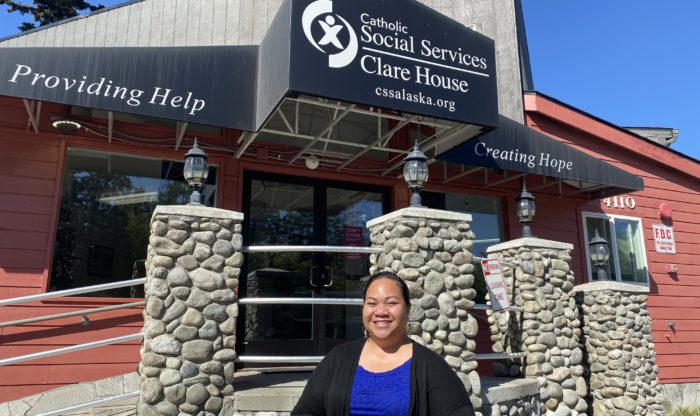
For Mercy Pulou, case management is more than a day job. It’s part of her calling. “I believe in being a good steward. When you are given opportunities, share the truth and make an impact.” Mercy has been working at Catholic Social Services for almost two years, and cares deeply about her clients and making an impact on her community.
Mercy is a strong advocate for her clients, empowering them to reach their full potential, and she never underestimates the power of listening, “We have brilliant people in the shelter trying to cope and overcome. They just need someone to listen…”
According to Mercy, communication and listening are the keystone pieces of case management. Without clear communication and good listening, much of her work wouldn’t be possible. Listening and understanding is the first step toward uncovering a client’s true needs and their potential. Mercy explains, “I see beyond what is in front of me. Whether the client hasn’t showered, or they are intoxicated…. There is something that keeping them going. Something we have yet to uncover.”
There’s a difference between the casual listening that happens on a phone call with a friend and the type of listening Mercy does. She explains she uses techniques like active listening and motivational interviewing. While the client is describing a situation, concern, or event, Mercy is thinking of leading questions to ask the client afterwards so that she can understand better. When listening to clients, you must always strive to understand better, learn more, and never pass judgement, “I never judge. You have to hold off on your own feelings and delay your response for as long as possible so you can get the full picture. When you respond, you allow your judgement to color what the client has told you.”
Mercy sees positive outcomes and better communication from active listening and motivational interviewing each day. She recently talked with a client about their difficulties paying rent. The client called and told her they couldn’t make rent that month because they had bought things for their apartment. Upon hearing this, Mercy was disappointed in herself – Maybe she hadn’t explained budgeting as well as she could have? Maybe she was unclear in their discussion about finances?
After hearing the client couldn’t make rent, Mercy did not outwardly respond. She could have said, “Do you remember our discussion on budgeting?” or “Are things for your apartment a need or want?”. Instead, she asked the client to explain further, and detail what exactly they had spent their money on. After asking more questions, Mercy discovered that the client had spent money on repairs to their vehicle which they needed for work. It was only because of Mercy’s understanding, patience, and use of listening techniques was she able to uncover the real problem and work on solutions.
Communication can be a challenge for everyone. That’s why active listening and motivational interviewing are extremely important in case management at Catholic Social Services. Catholic Social Services makes an extended effort to ensure all case managers receive training and education in the techniques Mercy used with her client, and many others.
According to Mercy, listening can be the solution to a multitude of problems. She sometimes sees a disconnect between some of the community and those experiencing homelessness. She thinks the solution is simple, listen. Mercy encourages anyone interested in solving homelessness to take the time to listen. “Have you listened to their story? After you listen, you learn some people just need love…”